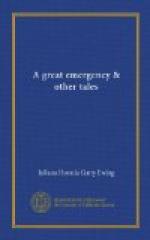And every time a barge was loaded up, and the bargemaster took his post at the rudder, whilst the old horse strained himself to start—and when the heavy boat swung slowly down the canal and passed out of sight, I felt more and more sorry to be left behind upon the wharf.
CHAPTER VI.
S. PHILIP AND S. JAMES—THE MONKEY-BARGE AND THE DOG—WAR, PLAGUE, AND FIRE—THE DULNESS OF EVERYDAY LIFE.
There were two churches in our town. Not that the town was so very large or the churches so very small as to make this needful. On the contrary, the town was of modest size, with no traces of having ever been much bigger, and the churches were very large and very handsome. That is, they were fine outside, and might have been very imposing within but for the painted galleries which blocked up the arches above and the tall pews which dwarfed the majestic rows of pillars below. They were not more than a quarter of a mile apart. One was dedicated to S. Philip and the other to S. James, and they were commonly called “the brother churches.” In the tower of each hung a peal of eight bells.
One clergyman served both the brother churches, and the services were at S. Philip one week and at S. James the next. We were so accustomed to this that it never struck us as odd. What did seem odd, and perhaps a little dull, was that people in other places should have to go to the same church week after week.
There was only one day in the year on which both the peals of bells were heard, the Feast of SS. Philip and James, which is also May Day. Then there was morning prayer at S. Philip and evening prayer at S. James, and the bells rang changes and cannons, and went on ringing by turns all the evening, the bell-ringers being escorted from one church to another with May garlands and a sort of triumphal procession. The churches were decorated, and flags put out on the towers, and everybody in the congregation was expected to carry a nosegay.
Rupert and I and Henrietta and Baby Cecil and the servants always enjoyed this thoroughly, and thought the churches delightfully sweet; but my Mother said the smell of the cottage nosegays and the noise of the bells made her feel very ill, which was a pity.
Fred Johnson once told me some wonderful stories about the brother churches. We had gone over the canal to a field not far from the cricketing field, but it was a sort of water-meadow, and lower down, and opposite to the churches, which made us think of them. We had gone there partly to get yellow flags to try and grow them in tubs as Johnson’s father did water-lilies, and partly to watch for a canal-boat or “monkey-barge,” which was expected up with coal. Fred knew the old man, and we hoped to go home as part of the cargo if the old man’s dog would let us; but he was a rough terrier, with an exaggerated conscience, and strongly objected to anything coming on board the boat which was not in the bill of lading. He could not even reconcile himself to the fact that people not connected with barges took the liberty of walking on the canal banks.




